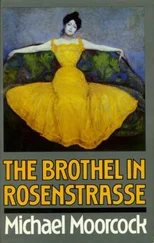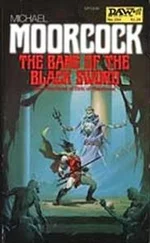Michael Moorcock - Breakfast in the Ruins
Здесь есть возможность читать онлайн «Michael Moorcock - Breakfast in the Ruins» весь текст электронной книги совершенно бесплатно (целиком полную версию без сокращений). В некоторых случаях можно слушать аудио, скачать через торрент в формате fb2 и присутствует краткое содержание. Жанр: Фантастика и фэнтези, на английском языке. Описание произведения, (предисловие) а так же отзывы посетителей доступны на портале библиотеки ЛибКат.
- Название:Breakfast in the Ruins
- Автор:
- Жанр:
- Год:неизвестен
- ISBN:нет данных
- Рейтинг книги:3 / 5. Голосов: 1
-
Избранное:Добавить в избранное
- Отзывы:
-
Ваша оценка:
- 60
- 1
- 2
- 3
- 4
- 5
Breakfast in the Ruins: краткое содержание, описание и аннотация
Предлагаем к чтению аннотацию, описание, краткое содержание или предисловие (зависит от того, что написал сам автор книги «Breakfast in the Ruins»). Если вы не нашли необходимую информацию о книге — напишите в комментариях, мы постараемся отыскать её.
Breakfast in the Ruins — читать онлайн бесплатно полную книгу (весь текст) целиком
Ниже представлен текст книги, разбитый по страницам. Система сохранения места последней прочитанной страницы, позволяет с удобством читать онлайн бесплатно книгу «Breakfast in the Ruins», без необходимости каждый раз заново искать на чём Вы остановились. Поставьте закладку, и сможете в любой момент перейти на страницу, на которой закончили чтение.
Интервал:
Закладка:
The distant noises seemed to combine and establish close rhythms and counter-rhythms coupled with the beating of his heart. He recognized the tune. Some American popular song he had heard in a film. He had hummed the same song for six months after he had seen the film in Berlin. It must have been four years ago. Maybe longer. He wished that he had had a chance to make love to a woman. He had always disdained whores. A decent man didn't need whores. He wished that he had been to a whore and found out what it was like. One had offered last year as he walked to the railway station.
The film had been called Sweet Music, he remembered. He had never learned all the English words, but had made up words to sound like them.
There's a tavern in the town, in the town, When atroola setsen dahn, setsen dahn, Und der she sits on a luvaduvadee, Und never, never sinka see. So fairdeewell mein on tooday...
He had had ambitions to be an opera singer and he had had ambitions to be a great writer.
The potential had all been there, it was just a question of choosing. He might even have been a great general.
His possible incarnations marched before him through the dust.
And then he was dead.
— You could be anything you wanted to be. His friend kisses his shoulder.
— Or nothing. Could I be a woman and give birth to five children? Karl bites the black man.
The black man leaps up. He is a blur. For a moment, in the half-light, Karl thinks that his friend is a woman and white and then an animal of some kind, teeth bared. The black man glowers at him—Don't do that to me!
And Karl wipes his lips.
He turns his back on his friend. Okay. You taste funny, anyway.
You are a priest, devoutly religious, you are made miserable by the very idea of violence. You are, in every sense, a man of peace.
One morning you are cutting bread in the small hall attached to your church. You hear screams and oaths coming from the church itself. You hurry into the church, the knife still in your hand.
The soldier of the enemy currently occupying your country is in the act of raping a girl of about thirteen. He has beaten her and torn her clothes. He is just about to enter her. She whimpers. He grunts. You recognize the girl as a member of your parish. Doubtless she came to the church for your help. You shout, but the soldier pays no attention. You implore him to stop to no avail.
If you kill the soldier with your knife it will save the young girl from being hurt any further. It might even save her life. Nobody knows the soldier has entered the church. You could hide the body easily.
If you merely knock him out—even if that's possible -he will almost certainly take horrible reprisals on you, your church and its congregation. It has happened before, in other towns. Yet you want to save the girl.
What would you do?
13
At The Anschwitz Ball: 1944:
Strings
The war in Europe has been won; but the air of Europe smells of blood. Nazis and Fascists have been defeated; but their leaders have not yet been destroyed. It is still touch-and-go even now, whether the surviving Nazis are to have another chance of power, or whether they can be made harmless for ever by their swift arraignment as war criminals. And make no mistake this is not simply a matter for self-evident criminals such as Goering, Rosenberg and those others guilty of outstanding crimes, or responsible for the orders which caused major atrocities.
I have before me about twenty dossiers from small, unimportant French villages, and some from better-known places. They are unemotional accounts based on the evidence of named witnesses, of events which occurred during the German occupation. The Massacre of Dun Les Plages on June 26, 1944; the destruction of the village of Manlay on July 31, 1944; the treatment and murder in the Gestapo barracks at Cannes—and so it goes on. Sometimes the names of the local Nazis responsible have been discovered and named; often not.
The full horror of these cold indictments are revealed by the photographs which accompany them. It is difficult to describe them. Two or three of the mildest only are reproduced here. The Nazis took delight in having themselves photographed with their victims while these were in their agony of outrage and torture. It is not a simple crime that is depicted, but a terrible degradation of man. All the most horrible instincts which survive in our subconscious, have come brutally out into the open. It is no relapse into savagery, because no savages ever behaved with such cold, unfeeling, educated brutality and shamelessness.
These dossiers are French. But the same story is repeated in every country the Germans occupied, and also from those countries which allied themselves with the Nazis. Arrests, deportations, questionings and punishment were all carried out with a deliberate maximum of brutality accompanied by every conceivable carnal license. Like the concentration camps, these methods aimed at the destruction of confidence in democratic values; at inducing a total surrender to the Nazi terror.
They succeeded for a time—probably more than most people who have never lived under Nazi domination care to believe. That fear and horror of the Nazi bully has not yet been eradicated. The war will not be over until all the outraged millions of once-occupied Europe enjoy full confidence that democratic Governments can protect their rights, and that those who have offended are punished and broken. The Nazis mobilized the Untermensch, the sub-human, into their ranks. The wickedness he worked is a vivid memory, and it must be exorcised before Europe can have peace.
PICTURE POST, June 23,1945.— Don't try that with me, you little white bastard! Karl displays his arms.
— I'm a black bastard now.
— We can soon change that.
— Oh, hell, I'm sorry, says Karl.—It was just an impulse.
— Well, says his friend grimly, you're certainly losing your inhibitions now, aren't you.
Karl is eighteen. He is very lucky, along with the other members of the orchestra. His mother told him there was a point to learning, that you never knew when it came in useful, fiddle playing. And it was beautifully warm in the barracks. He hoped they would dance all night.
— Come back to bed, says Karl.—Please...
— I thought you were a nice, simple, uncomplicated sort of chap, says the black man.—That's what attracted me to you in the first place. Ah, well—it was my own fault, I suppose.
Karl is eighteen and playing Johann Strauss. How beautiful. How his mother would have loved it. There are tears in his eyes. He hoped they would dance forever! The Oswiecim Waltz!
— Well, I'm not at my best says Karl.—I wasn't when you met me. That's why I was in the Roof Garden.
— It's true, says his friend, that we hardly know each other yet.
KARL WAS EIGHTEEN. His mother had been given an injection some time ago and she had died. His father had probably been killed in Spain. Karl sat behind the screen with the other members of the orchestra and he played the violin.
That was his job in Auschwitz. It was the plum job and he had been lucky to get it. Others were doing much less pleasant work and it was so cold outside. The big barrack hall was well-heated for the Christmas Dance and all the guards and non-commissioned officers, their sweethearts and wives, were enjoying themselves thoroughly, in spite of rations being so short.
Karl could see them through a gap in the screen as he and the others played The Blue Danube for the umpteenth time that evening. Round and round went the brown and grey uniforms; round and round went the skirts and the dresses. Boots stamped on the uncarpeted boards of the hall. Beer flowed. Everyone laughed and joked and sang and enjoyed themselves. And behind the leather upholstered screen borrowed for the occasion the band played on.
Читать дальшеИнтервал:
Закладка:
Похожие книги на «Breakfast in the Ruins»
Представляем Вашему вниманию похожие книги на «Breakfast in the Ruins» списком для выбора. Мы отобрали схожую по названию и смыслу литературу в надежде предоставить читателям больше вариантов отыскать новые, интересные, ещё непрочитанные произведения.
Обсуждение, отзывы о книге «Breakfast in the Ruins» и просто собственные мнения читателей. Оставьте ваши комментарии, напишите, что Вы думаете о произведении, его смысле или главных героях. Укажите что конкретно понравилось, а что нет, и почему Вы так считаете.








